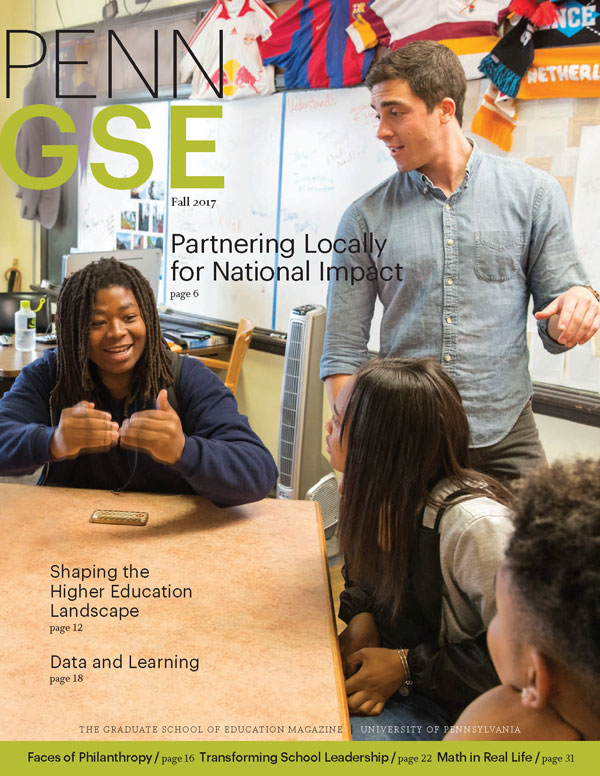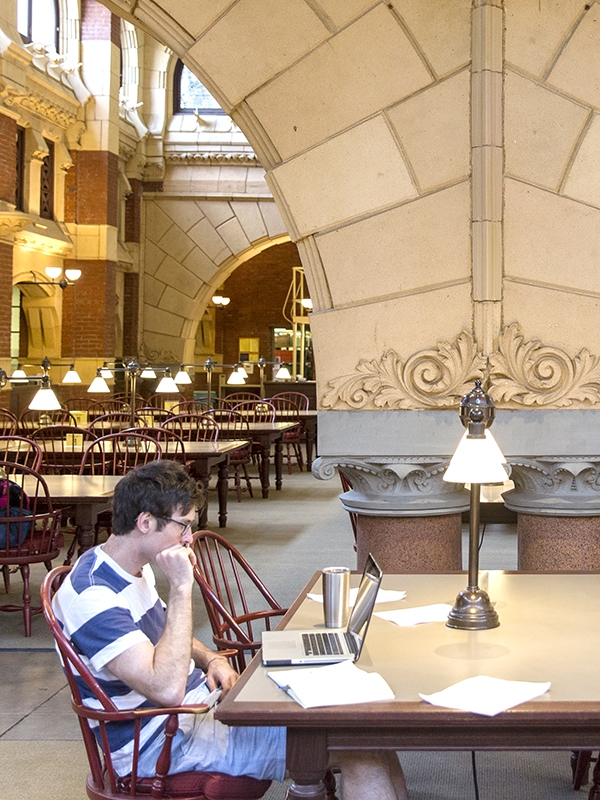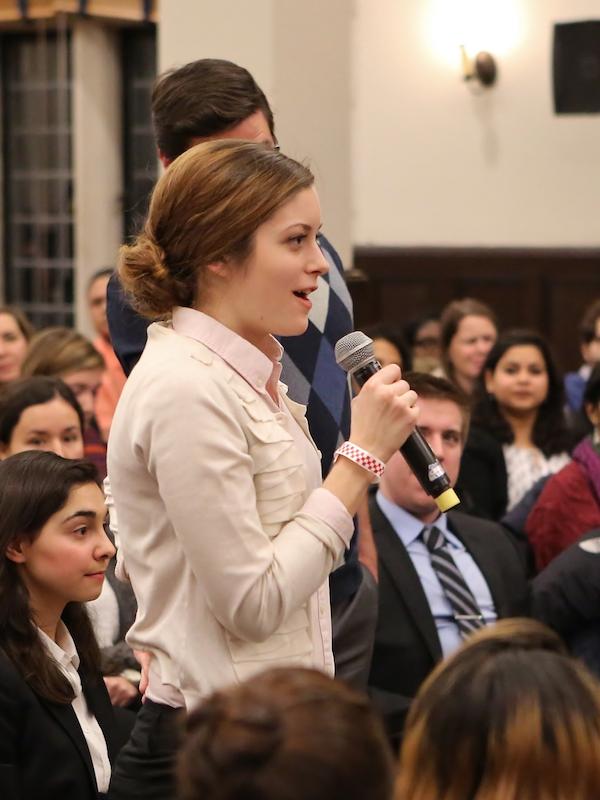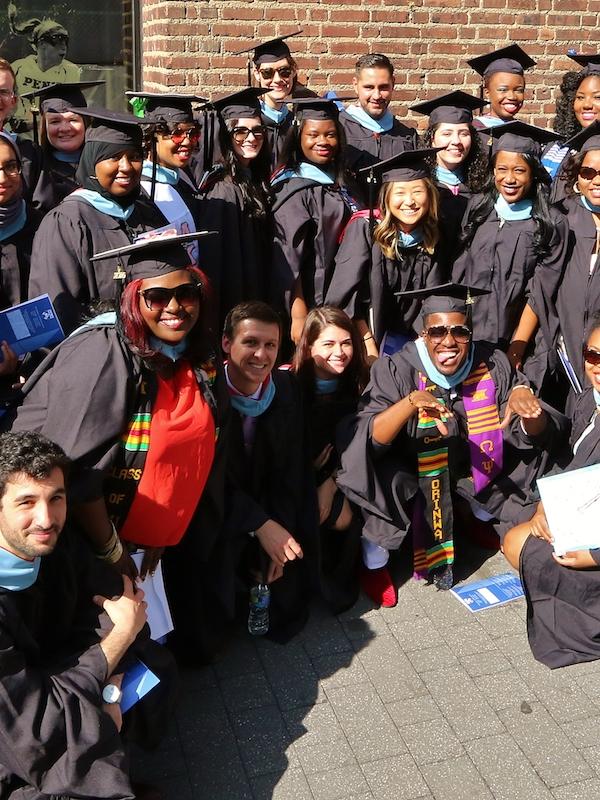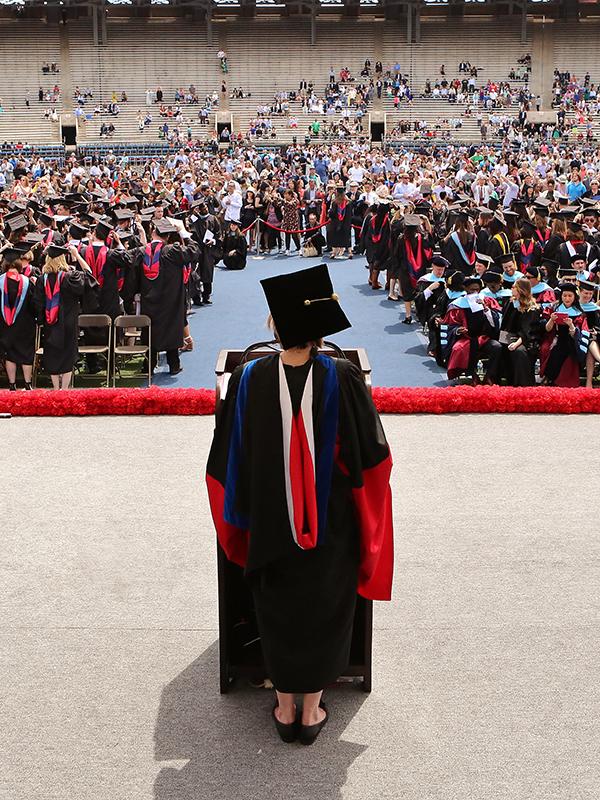Penn GSE in Philadelphia: Partnering Locally for National Impact
by Juliana Rosati
If we’re going to serve all the needs of the whole child—health, mental health, and academics—then we need to draw from all three fields to do that.”
How can a great graduate school of education help to change the life trajectories of children in urban schools? A passion for answering that question drew Dean Pam Grossman to Penn GSE, a school with the expertise and desire, along with a critical location, to transform lives through education.
“Philadelphia has long had one of the highest child poverty rates among the nation’s largest cities,” says Dr. Grossman. “And the number of children in poverty has been growing nationally. By tackling this problem here, we are developing models that can be used across the country.”
Grossman is taking Penn GSE’s partnership with The School District of Philadelphia to the next level, building upon GSE’s longtime commitment to urban education and engagement with the District. Employing new approaches that amplify the reach of this work and allow GSE to join forces with other Penn schools, she views the partnership as a top priority in her vision for the School.
Building Upon a Legacy
For decades, Penn GSE has partnered with The School District of Philadelphia to improve the academic achievement and life outcomes of Philadelphia children and youth. Today that commitment includes 566 programs that Penn GSE students, faculty, and alumni conduct in 270 schools throughout the District.
The array of programs is wide—field placements of GSE students in teaching and counseling; professional development for District teachers; workshops in subjects like science, coding, and filmmaking for District students; research by GSE faculty to improve education; alumni working as teachers and leaders; and more, all summarized in an interactive map at https://phillymap.gse.upenn.edu.
Complementing this broad engagement, GSE leads two intensive University-wide partnership with individual K–8 schools in Penn’s local community of West Philadelphia—the Sadie Tanner Mosell Alexander University of Pennsylvania Partnership School (Penn Alexander) and the Henry C. Lea School—providing a range of resources to the schools. With different histories and models of engagement, both partnerships illustrate Penn GSE’s commitment to developing new knowledge and approaches that increase opportunity for underserved children.
“Both partnerships are important to the University,” says Dr. Caroline L. Watts, director of school and community engagement and senior lecturer at Penn GSE. The Office of School and Community Engagement, recently established by Dean Grossman, is enhancing GSE’s systems and processes of working with the city. “We are looking at what each model of partnership teaches us about university-assisted schools—what is sustainable and replicable, and which of our efforts make the most difference for students,” Watts says.
“We are looking at what each model of partnership teaches us about university-assisted schools—what is sustainable and replicable, and which of our efforts make the most difference for students.”
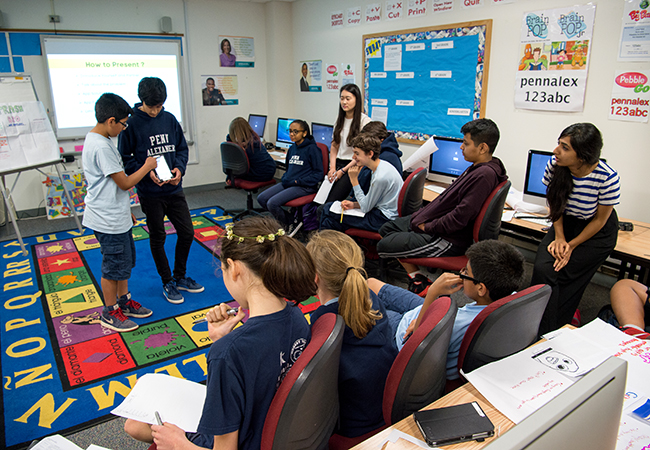
The partnership with Lea, a neighborhood school established more than one hundred years ago, involves a different challenge, that of working with an existing school that operates within complex circumstances. Lea serves a student population that is predominantly low-income and includes substantial numbers of immigrant students, as well as students with special education needs. Having collaborated for decades with lea, Penn deepened the partnership in 213. It now includes a GSE-based liaison, doctoral student Rich Liuzzi, lC’04, working onsite. GSE alumna ShaVon Savage, GED’02, G’07, L’07, became principal at the start of the 2016-2017 year. The partnership focuses on integrating GSE and Penn resource with the efforts of Lea’s community to support excellence for all Lea students.
Now, in response to a District-wide initiative for mathematics improvement, Penn GSE is expanding the foundation of the Penn Alexander and lea partnerships to work closely with the sixteen West Philadelphia schools of Neighborhood Network 2, a group that includes Penn Alexander and Lea.
“It’s really a nice level up from our work with individual schools,” says Watts of the partnership with the network, which began in the fall of 2016. “It allows us to provide support for multiple schools simultaneously.”
Funded in part by the Otto Haas Foundation and the William Penn Foundation, the partnership has brought a full-time liaison, Dr. Kathleen Krier, to the network, along with one doctoral alumna and two doctoral students, all from Penn GSE. Through professional development sessions that address topics in leadership, instruction, and curriculum implementation, Krier and her team support and advise the network’s principals and math “lead” teachers, newly designated by the District to lead mathematics improvement in each school.
“This project is now being seen by the District as an incubator for District-wide mathematics improvement,” says Watts. By developing effective approaches in one network, Penn GSE can chart a broad course for change.
Helping the math lead teachers understand their new roles has been a priority, Krier reports. The role may include coordinating testing and resources or co-teaching with other teachers. “In addition to providing the insight and coaching of my team, we’re fostering collaboration so that the math lead teachers and principals can support each other across schools,” Krier says.
Another challenge facing the schools has been the need to implement a brand-new, District-wide math curriculum that puts an increased emphasis on mathematical reasoning and allowing students to find their own paths to the correct solution of a given problem.
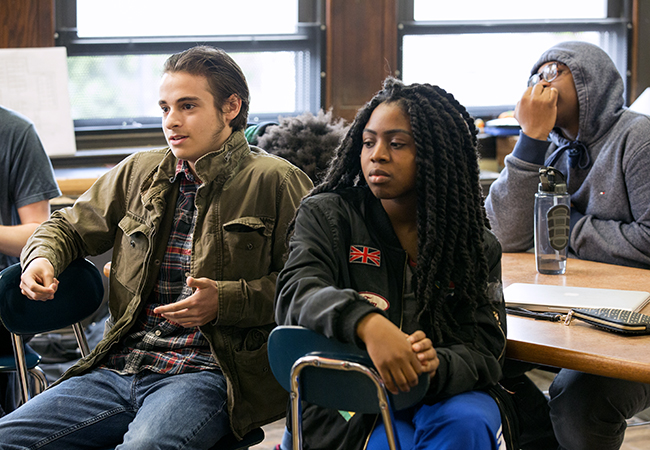
“The meetings provided a good support system to talk about what was working for each of us as we used the curriculum,” says Maria McLaughlin, who participated in Krier’s sessions as the math lead teacher at Samuel Gompers Elementary School. “I was able to come back to the school with new ideas for myself and to offer the other teachers.”
Having taught in the District for seventeen years, McLaughlin views the District’s mathematics initiatives and network-wide partnership with Penn GSE as significant steps forward. “This is the first time I’ve seen such a drive for math instruction,” she says. “It’s important that this work continues.” After implementing the new curriculum in her classroom, she was gratified to see her students’ progress. “By the end of the year, they were able to articulate their reasoning and their problem-solving strategies with such eloquence,” she says. “They saw that there are many ways to solve problems, which a lesson that goes beyond math.”
Partnering Across Professions
For children facing adversity, education can offer a vital opportunity, especially when school is the most stable environment in their lives. However, many of the challenges that children in poverty encounter outside of school may affect their educational experiences. When children have been exposed to lead poisoning, suffer the trauma of homelessness, or have responsibilities for taking care of younger siblings, their attendance and performance at school will likely reflect these circumstances. Given these realities, how can education be responsive to the challenges that children face outside of the classroom?
Dean Grossman found a compelling answer when she and the deans of two other Penn schools joined the university in 2014-2105. Discovering a shared commitment to improving the health and well-being of children and families, Dean Grossman, Dean John L. Jackson of Penn Social Policy and Practice (SP2), and Dean Antonia Villaruel of Penn Nursing launched the Penn Futures Project to develop solutions at the intersection of their three professional fields.
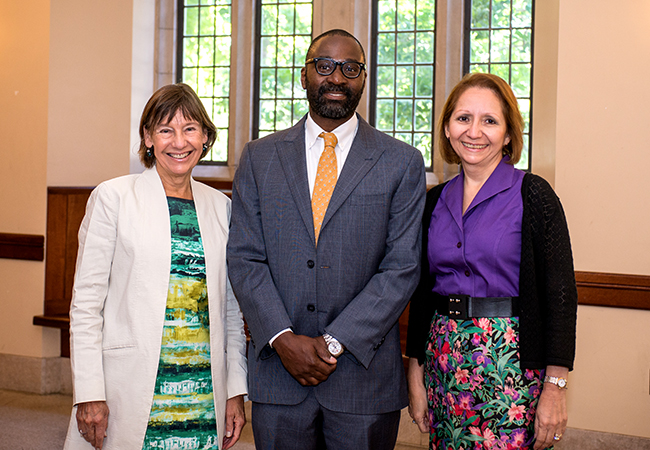
“So many of the problems that children in poverty face begin well before they start school, and teachers will need to work with counselors, social workers, and health professionals to address the needs of their students,” says Grossman. “We are creating a cross-professional approach to not only support children and families, but also prepare our students for their careers.”
During 2016-2017, Penn Futures funded a range of cross-school collaborations that brought together the professions of education, social work, and nursing, with further financial assistance from the Office of the Provost. One project used the power of linking administrative data across multiple government agencies to help the City of Philadelphia allocate resources for early childhood education to neighborhoods with the greatest need. Led by Penn GSE professors John Fantuzzo and Vivian Gadsden, SP2 professor Dennis Culhane, Nursing professors Janet Deatrick and Terri Lipman, and Katherine Barghaus, GR’12, executive director of GSE’s Penn Child Research Center, the project built upon work by Drs. Fantuzzo and Culhane to help state and local governments improve education, health, and human services through linked data.
In partnership with Philadelphia’s Data Management Office, the team created maps showing the areas where children faced multiple risk factors, like lead exposure and homelessness, and areas lacking access to prekindergarten programs that could counteract the toxic stressors in children’s lives. These maps highlighted the neighborhoods in greatest need of high-quality early childhood education. The City’s Commission on Universal Prekindergarten used this research in their recommendations to expand quality programming for young children. The research also added to the momentum of efforts to use city resources, such as a new soda tax, strategically to support early childhood services.
“It’s a great example of work that informs policymakers so they can make wise decisions about using scarce resources,” says Grossman.
Another project brought students from all three Penn Futures schools beyond West Philadelphia to train collaboratively at Kensington Health Sciences Academy (KHSA), a high school offering career and technical programs. Located in the northern part of the city, the school’s neighborhood of Kensington is part of Pennsylvania’s First Congressional District, shown in recent years to have one of the highest levels of hunger in the nation.
The location represents another way Penn GSE is broadening its work in Philadelphia, according to Watts. “We want to move farther out into different parts of the city, to places where we can meet a need by integrating resources from GSE and Penn,” she says.
Led by Penn GSE Teacher Education Program Director Kate Kinney Grossman, the project brought nine Penn interns to KHSA in 2016- 2017. This included two students in GSE’s Teacher Education program, three in GSE’s Professional Counseling program, two in SP2’s Master of Social Work program, and two Penn Nursing undergraduates.
While field placements are an established part of the Penn programs, the work at KHSA was unusual for bringing students from different Penn programs together to train at one site, with a new, shared curriculum.
“If we’re going to serve all the needs of the whole child—health, mental health, and academics—then we need to draw from all three fields to do that,” says Kinney Grossman. “For me it was an opportunity to rethink how we’re preparing teachers for high-needs contexts.”
One of the most significant outcomes of the year for the KHSA was the dramatic increase in the number of counselors and social workers available to the high school students. Without the Penn interns, GSE alumna and full-time KHSA school counselor Diana Finesmith, GED’16, would have served the student body of 450 alone. With the addition of the three students from GSE’s Professional Counseling program and two from SP2’s Master of Social Work program, the student-counselor ratio lowered to 75:1, a figure unheard of in most urban schools.
“The challenges we’re working with at Kensington are very intense,” says Finesmith. “Our student population faces a variety of issues, from trauma and abuse, to grief and loss, to mental and behavioral health concerns.” With the five interns in place, her department was able to meet with three hundred students during the year. This included ongoing work with over ninety students.
“We’ve really been able to create a culture and environment where students feel safe and comfortable enough to come and talk with us,” says Finesmith. “Counseling and mental health still often hold a stigma, and we’ve been able to begin to break down that barrier and give students a level of consistent emotional support that they might not otherwise have in their lives.”
Penn faculty from the three schools took turns leading group discussions for all of the Penn interns, considering KHSA students’ challenges through the perspective of all three fields.
“Allowing future nurses to learn in this way, alongside other professions, will give us richer professionals, those who can think critically and solve problems,” says Monica Harmon, senior lecturer, MSN, MPH, BSN, who oversaw the project for Penn Nursing during the 2016-2017 school year.
“For the first time, social work students could have professors from GSE and Nursing impact their fieldwork learning on a regular basis,” adds Anne Weiss, MSW, LSW, director of field education, who managed the project for SP2.
Another facet of the project involves professional development for KHSA teachers offered by students in GSE’s Ed.D. in Educational Leadership program and Penn Nursing. That effort, and all of the Penn Futures work at KHSA, embraces a “trauma-informed” approach meant to increase awareness across the school of the challenges students face outside of the building. Before deciding to discipline a student who acts out or breaks a rule, for example, adults in the school are encouraged to try starting a dialogue with the student to learn what is behind the problematic behavior, or consider sending the student to a counselor.
The idea is that everybody in the school should approach students with the understanding that they may have experienced something that is causing them anger or sadness or frustration in their life,” says Nimet Eren, GED’09, principal of KHSA beginning in 2017-2018. A GSE alumna and current doctoral student, Eren has been a part of the GSE community through her eleven years as a Philadelphia educator, participating in the Philadelphia Writing Project and working with master’s students after receiving her degree.
The project will continue in 2017-2018, and KHSA has begun the year with a total of six GSE and Penn alumni on staff—Eren and Finesmith; teachers Jodi Miller, C’14, GED’15, and Eric Clark, C’15; and two of last year’s GSE interns who were hired as full-time employees.
Both former interns report enriching experiences that prepared them for their careers. “Working with KHSA for my student teaching was a great opportunity to learn what it’s like to teach in a neighborhood school, and to do so in a very supportive environment,” says Maddie Luebbert, GED’17, who was hired as a ninth-grade English teacher following her field placement. “KHSA has a very tight-knit staff, and the presence of Penn interns and faculty gave me additional levels of support.”
Nicholas Allen, GED’16, GED’17, hired as a school counselor after his field placement as a student in GSE’s Professional Counseling program, says, “I really enjoyed being part of the strong community of caring at KHSA—staff give me so much individual attention to students. It’s something you don’t see in many schools, and it’s not what you expect to see in a school that’s so under resourced.
Looking Ahead
As Penn GSE deepens the partnership with Neighborhood Network 2 and Penn Futures supports a variety of projects—including one led by Watts to develop a cross-school certificate program at Penn in child welfare—the horizons of GSE’s work in Philadelphia continue to broaden.
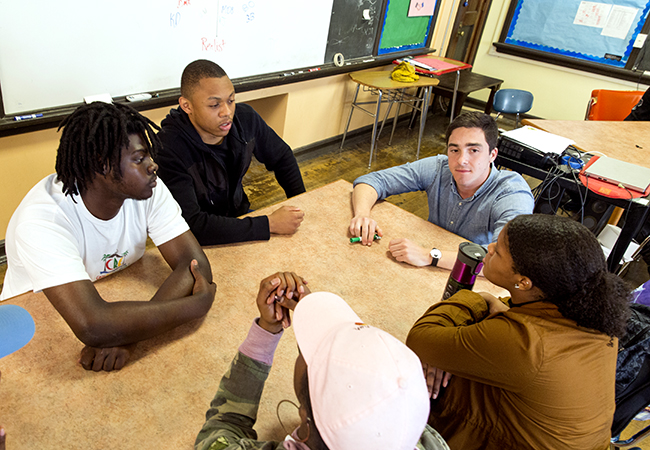
A Penn Futures conference on parenting and early childhood brought together researchers, practitioners, and city officials in June. A new grant from the Robert Wood Johnson Foundation has established a Calvin Bland Faculty Fellowship in each Penn Futures school to support research on improving the lives of at-risk young men and boys of color and their families.
Most importantly, Penn GSE is committed to work of broad practical importance. “In a knowledge economy, our country cannot afford to leave children behind,” says Grossman. “Penn GSE is having an enormous impact not only through the work of our students and faculty, but also through the graduates we produce each year who go on to influence the enation and world as educators and leaders.”
This article originally appeared in the Fall 2017 issue of The Penn GSE Magazine.

